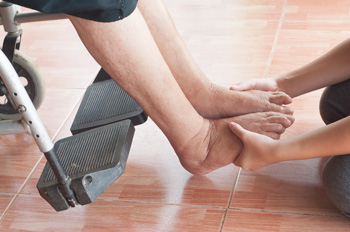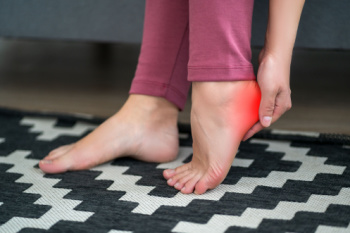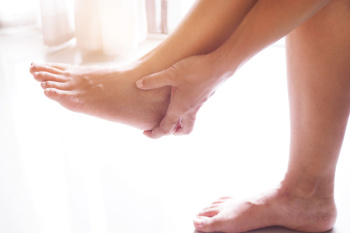Connect With Us
Blog
Items filtered by date: March 2024
The Importance of Foot Check-Ups For Older Adults
 Regular foot assessments and timely management of foot-related issues in older adults play a huge role in maintaining mobility and reducing the risk of falls, which are major concerns for this age group. The feet can change in structure and function as people age. Especially when paired with conditions such as arthritis, diabetes, and circulatory problems, this can significantly impact a person’s ability to walk and perform daily activities safely. By addressing these issues early through routine podiatry care, potential problems can be managed or corrected before they lead to more serious complications and falls. This approach helps older adults both retain their motor performance and independence, as well as reduce their fear of falling. Fear itself can lead to a decrease in physical activity, further diminishing muscle strength and balance, which increases the risk of falls. It is suggested that elderly people with possible foot and aging concerns make regular appointments with a podiatrist, to address any potential problems quickly.
Regular foot assessments and timely management of foot-related issues in older adults play a huge role in maintaining mobility and reducing the risk of falls, which are major concerns for this age group. The feet can change in structure and function as people age. Especially when paired with conditions such as arthritis, diabetes, and circulatory problems, this can significantly impact a person’s ability to walk and perform daily activities safely. By addressing these issues early through routine podiatry care, potential problems can be managed or corrected before they lead to more serious complications and falls. This approach helps older adults both retain their motor performance and independence, as well as reduce their fear of falling. Fear itself can lead to a decrease in physical activity, further diminishing muscle strength and balance, which increases the risk of falls. It is suggested that elderly people with possible foot and aging concerns make regular appointments with a podiatrist, to address any potential problems quickly.
Proper foot care is something many older adults forget to consider. If you have any concerns about your feet and ankles, contact Tanisha Richmond, DPM from Richmond Foot & Ankle, LLC. Our doctor can provide the care you need to keep you pain-free and on your feet.
The Elderly and Their Feet
As we age we start to notice many changes in our body, but the elder population may not notice them right away. Medical conditions may prevent the elderly to take notice of their foot health right away. Poor vision is a lead contributor to not taking action for the elderly.
Common Conditions
- Neuropathy – can reduce feeling in the feet and can hide many life-threatening medical conditions.
- Reduced flexibility – prevents the ability of proper toenail trimming, and foot cleaning. If left untreated, it may lead to further medical issues.
- Foot sores – amongst the older population can be serious before they are discovered. Some of the problematic conditions they may face are:
- Gouging toenails affecting nearby toe
- Shoes that don’t fit properly
- Pressure sores
- Loss of circulation in legs & feet
- Edema & swelling of feet and ankles
Susceptible Infections
Diabetes and poor circulation can cause general loss of sensitivity over the years, turning a simple cut into a serious issue.
If you have any questions please feel free to contact our office located in Dayton, OH . We offer the newest diagnostic and treatment technologies for all your foot and ankle needs.
Treatment for a Dislocated Ankle

Experiencing a dislocated ankle can be a traumatic event, often leading to significant damage and requiring specialized treatment. A podiatrist, who is an expert in foot and ankle conditions, plays an essential role in managing such injuries. Treatment, which typically involves realigning the ankle joint, may also require the application of a splint or cast for stabilization. In severe cases involving fractures, surgery may be necessary to ensure proper healing. The recovery process varies in duration, emphasizing the importance of regular follow-up appointments with a podiatrist to monitor progress and address any emerging issues. Podiatrists possess the expertise to provide targeted care, facilitating optimal recovery, and minimizing the risk of complications. If you have dislocated an ankle, it is suggested that you schedule an immediate appointment with a podiatrist who can perform a thorough exam, and offer the correct treatment and follow-up care you need.
Ankle pain can have many different causes and the pain may potentially be serious. If you have ankle pain, consult with Tanisha Richmond, DPM from Richmond Foot & Ankle, LLC. Our doctor will assess your condition and provide you with quality foot and ankle treatment.
Ankle pain is any condition that causes pain in the ankle. Due to the fact that the ankle consists of tendons, muscles, bones, and ligaments, ankle pain can come from a number of different conditions.
Causes
The most common causes of ankle pain include:
- Types of arthritis (rheumatoid, osteoarthritis, and gout)
- Ankle sprains
- Broken ankles
- Achilles tendinitis
- Achilles tendon rupture
- Stress fractures
- Tarsal tunnel syndrome
- Plantar fasciitis
Symptoms
Symptoms of ankle injury vary based upon the condition. Pain may include general pain and discomfort, swelling, aching, redness, bruising, burning or stabbing sensations, and/or loss of sensation.
Diagnosis
Due to the wide variety of potential causes of ankle pain, podiatrists will utilize a number of different methods to properly diagnose ankle pain. This can include asking for personal and family medical histories and of any recent injuries. Further diagnosis may include sensation tests, a physical examination, and potentially x-rays or other imaging tests.
Treatment
Just as the range of causes varies widely, so do treatments. Some more common treatments are rest, ice packs, keeping pressure off the foot, orthotics and braces, medication for inflammation and pain, and surgery.
If you have any questions, please feel free to contact our office located in Dayton, OH . We offer the newest diagnostic and treatment technologies for all your foot care needs.
Plantar Warts Can Be Treated!
Symptoms of Heel Spurs

A heel spur is a sharp, bony outgrowth often resulting from irritation of the plantar fascia, known as plantar fasciitis. Increased strain on the Achilles tendon can exacerbate this growth, either beneath the foot, a lower heel spur, or at the back of the heel, a rear heel spur. While visible on X-rays, heel spurs may not be apparent externally. Symptoms include stabbing heel pain, especially when weight is applied, particularly in the morning. Inflammation can cause swelling and warmth, sometimes accompanied by a visible protrusion. Though occasionally asymptomatic, heel spurs can significantly impact mobility and comfort. Common causes involve prolonged or uneven pressure during walking or running, leading to inflammation of the plantar fascia or Achilles tendon. Addressing these issues involves reducing strain, managing inflammation, and enhancing foot muscle strength. Appropriate footwear, weight management, and foot muscle activation are important preventive measures. If you are suffering from a painful heel spur, it is suggested that you make an appointment with a podiatrist who can make a proper diagnosis and offer you treatment options fitting your situation.
Heel spurs can be incredibly painful and sometimes may make you unable to participate in physical activities. To get medical care for your heel spurs, contact Tanisha Richmond, DPM from Richmond Foot & Ankle, LLC. Our doctor will do everything possible to treat your condition.
Heels Spurs
Heel spurs are formed by calcium deposits on the back of the foot where the heel is. This can also be caused by small fragments of bone breaking off one section of the foot, attaching onto the back of the foot. Heel spurs can also be bone growth on the back of the foot and may grow in the direction of the arch of the foot.
Older individuals usually suffer from heel spurs and pain sometimes intensifies with age. One of the main condition's spurs are related to is plantar fasciitis.
Pain
The pain associated with spurs is often because of weight placed on the feet. When someone is walking, their entire weight is concentrated on the feet. Bone spurs then have the tendency to affect other bones and tissues around the foot. As the pain continues, the feet will become tender and sensitive over time.
Treatments
There are many ways to treat heel spurs. If one is suffering from heel spurs in conjunction with pain, there are several methods for healing. Medication, surgery, and herbal care are some options.
If you have any questions feel free to contact our office located in Dayton, OH . We offer the latest in diagnostic and treatment technology to meet your needs.
Causes and Treatments for Plantar Fasciitis

Heel pain is often caused by plantar fasciitis, which is an inflammation of the fascia running along the sole of the foot. Diagnosis of plantar fasciitis relies on symptoms such as morning pain and can be exacerbated by factors like obesity, flat feet, or excessive standing on hard surfaces. There are various relief techniques that affected individuals can take advantage of, and a podiatrist can guide you toward the methods that are best for you. If you have chronic heel pain, it is suggested that you schedule an appointment with this type of doctor who can perform an accurate diagnosis and get you the right treatment.
Many people suffer from bouts of heel pain. For more information, contact Tanisha Richmond, DPM of Richmond Foot & Ankle, LLC. Our doctor can provide the care you need to keep you pain-free and on your feet.
Causes of Heel Pain
Heel pain is often associated with plantar fasciitis. The plantar fascia is a band of tissues that extends along the bottom of the foot. A rip or tear in this ligament can cause inflammation of the tissue.
Achilles tendonitis is another cause of heel pain. Inflammation of the Achilles tendon will cause pain from fractures and muscle tearing. Lack of flexibility is also another symptom.
Heel spurs are another cause of pain. When the tissues of the plantar fascia undergo a great deal of stress, it can lead to ligament separation from the heel bone, causing heel spurs.
Why Might Heel Pain Occur?
- Wearing ill-fitting shoes
- Wearing non-supportive shoes
- Weight change
- Excessive running
Treatments
Heel pain should be treated as soon as possible for immediate results. Keeping your feet in a stress-free environment will help. If you suffer from Achilles tendonitis or plantar fasciitis, applying ice will reduce the swelling. Stretching before an exercise like running will help the muscles. Using all these tips will help make heel pain a condition of the past.
If you have any questions please contact our office located in Dayton, OH . We offer the newest diagnostic and treatment technologies for all your foot and ankle needs.
Arthritis Can Cause Pain in the Feet and Ankles
Blog Archives
- April 2025
- March 2025
- February 2025
- January 2025
- December 2024
- November 2024
- October 2024
- September 2024
- August 2024
- July 2024
- June 2024
- May 2024
- April 2024
- March 2024
- February 2024
- January 2024
- December 2023
- November 2023
- October 2023
- September 2023
- August 2023
- July 2023
- June 2023
- May 2023
- April 2023
- March 2023
- February 2023
- January 2023
- December 2022
- November 2022
- October 2022
- September 2022
- August 2022
- July 2022
- June 2022
- May 2022
- April 2022
- March 2022
- February 2022
- January 2022
- December 2021
- November 2021
- October 2021
- September 2021
- August 2021
- July 2021
- June 2021
- May 2021
- April 2021
- March 2021
- February 2021
- January 2021
- December 2020
- November 2020
- October 2020
- September 2020
- August 2020
- July 2020
- June 2020
- May 2020
- April 2020
- March 2020
- February 2020
- January 2020
- December 2019
- November 2019
- October 2019
- September 2019
- August 2019
- July 2019
- June 2019
- May 2019
- April 2019
- March 2019
- February 2019
- January 2019
- December 2018
- November 2018

